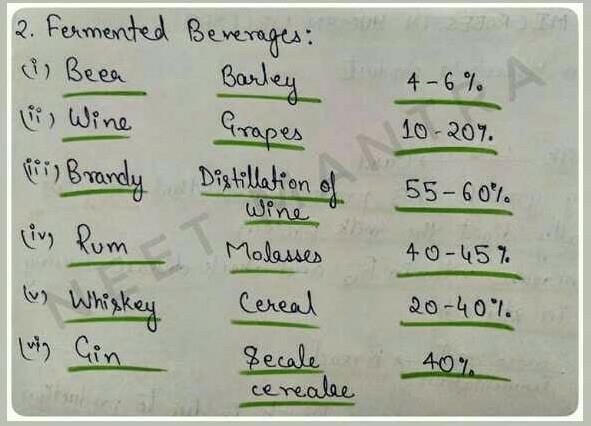NEET Exam > NEET Questions > Fermented beverages with % of alcohol content...
Start Learning for Free
Fermented beverages with % of alcohol content?
Most Upvoted Answer
Fermented beverages with % of alcohol content?

Community Answer
Fermented beverages with % of alcohol content?
Types of Fermented Beverages
1. Beer
- Alcohol Content: Varies from 2% to 12%
- Beer is one of the most consumed fermented beverages worldwide.
- It is made by fermenting malted barley or other grains with yeast.
- The alcohol content in beer depends on factors such as the fermentation process, type of yeast used, and the length of fermentation.
- Beers can have a wide range of flavors and styles, including lagers, ales, stouts, and IPAs.
2. Wine
- Alcohol Content: Typically between 8% and 14%
- Wine is produced by fermenting crushed grapes or other fruits with yeast.
- The alcohol content in wine is influenced by the sugar content in the grapes and the fermentation process.
- Wines can be classified into various types such as red, white, rosé, sparkling, and fortified wines.
- The flavors and aromas of wine are influenced by factors like grape variety, climate, soil, and winemaking techniques.
3. Cider
- Alcohol Content: Typically between 2% and 8%
- Cider is made by fermenting apple juice or pear juice.
- The alcohol content in cider can vary depending on the variety of apples used and the fermentation process.
- There are different types of cider, including traditional cider, sparkling cider, and ice cider.
- Cider often has a crisp, fruity flavor and is popular in many regions with apple orchards.
4. Mead
- Alcohol Content: Varies from 3% to 20%
- Mead is an ancient fermented beverage made by fermenting honey with water and yeast.
- The alcohol content in mead depends on the amount of honey used and the fermentation process.
- It can be still or carbonated and may have additional flavors from fruits, herbs, or spices.
- Mead is known for its sweet taste and is often associated with medieval times.
5. Sake
- Alcohol Content: Usually between 15% and 20%
- Sake is a traditional Japanese rice wine.
- It is made by fermenting polished rice with koji molds and yeast.
- The alcohol content in sake is higher compared to many other fermented beverages.
- Sake can have a wide range of flavors, from dry to sweet, and is often served warm or chilled.
6. Distilled Spirits
- Alcohol Content: Varies widely, usually above 20%
- Distilled spirits are produced by dist

|
Explore Courses for NEET exam
|

|
Similar NEET Doubts
Fermented beverages with % of alcohol content?
Question Description
Fermented beverages with % of alcohol content? for NEET 2025 is part of NEET preparation. The Question and answers have been prepared according to the NEET exam syllabus. Information about Fermented beverages with % of alcohol content? covers all topics & solutions for NEET 2025 Exam. Find important definitions, questions, meanings, examples, exercises and tests below for Fermented beverages with % of alcohol content?.
Fermented beverages with % of alcohol content? for NEET 2025 is part of NEET preparation. The Question and answers have been prepared according to the NEET exam syllabus. Information about Fermented beverages with % of alcohol content? covers all topics & solutions for NEET 2025 Exam. Find important definitions, questions, meanings, examples, exercises and tests below for Fermented beverages with % of alcohol content?.
Solutions for Fermented beverages with % of alcohol content? in English & in Hindi are available as part of our courses for NEET.
Download more important topics, notes, lectures and mock test series for NEET Exam by signing up for free.
Here you can find the meaning of Fermented beverages with % of alcohol content? defined & explained in the simplest way possible. Besides giving the explanation of
Fermented beverages with % of alcohol content?, a detailed solution for Fermented beverages with % of alcohol content? has been provided alongside types of Fermented beverages with % of alcohol content? theory, EduRev gives you an
ample number of questions to practice Fermented beverages with % of alcohol content? tests, examples and also practice NEET tests.

|
Explore Courses for NEET exam
|

|
Signup for Free!
Signup to see your scores go up within 7 days! Learn & Practice with 1000+ FREE Notes, Videos & Tests.
























